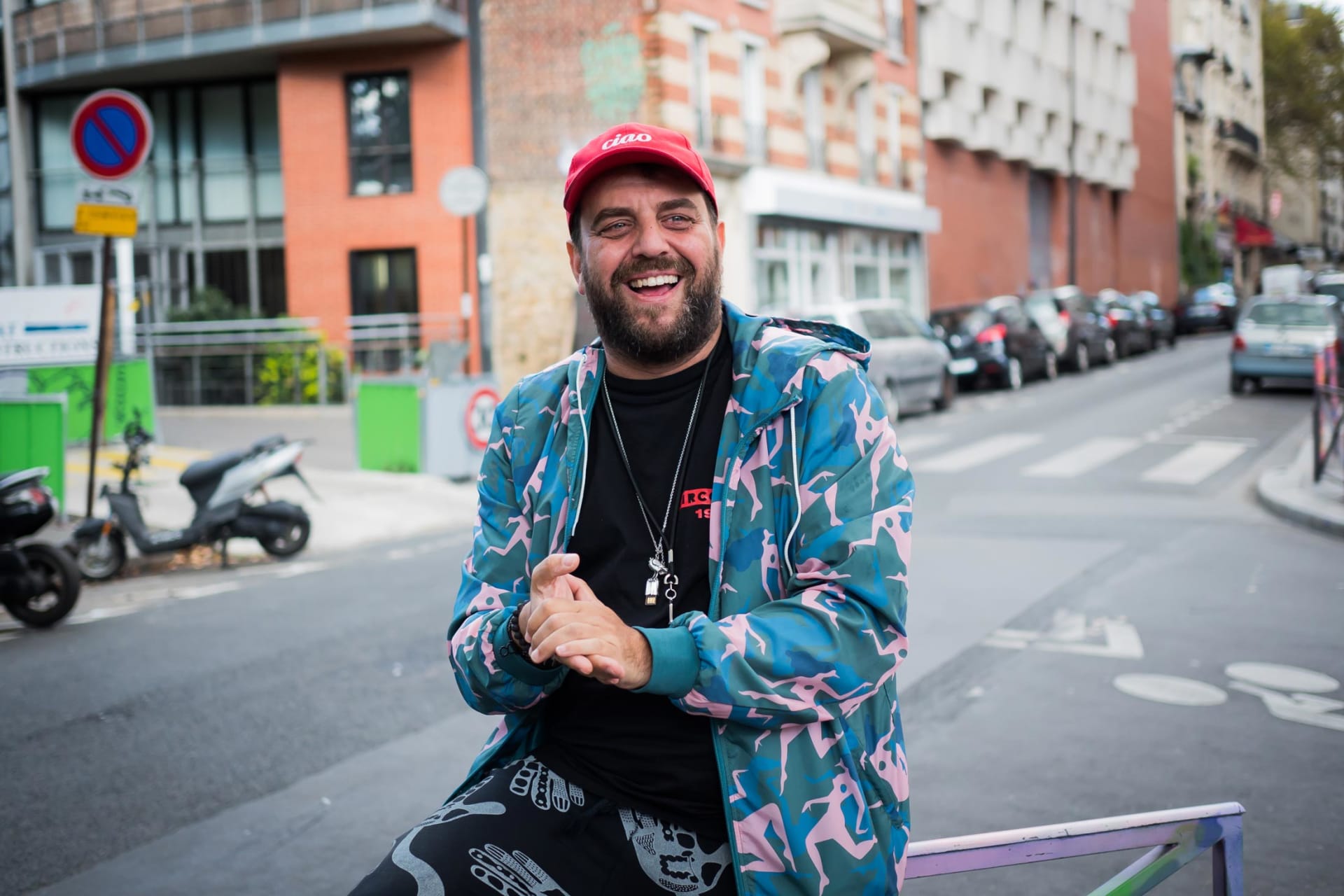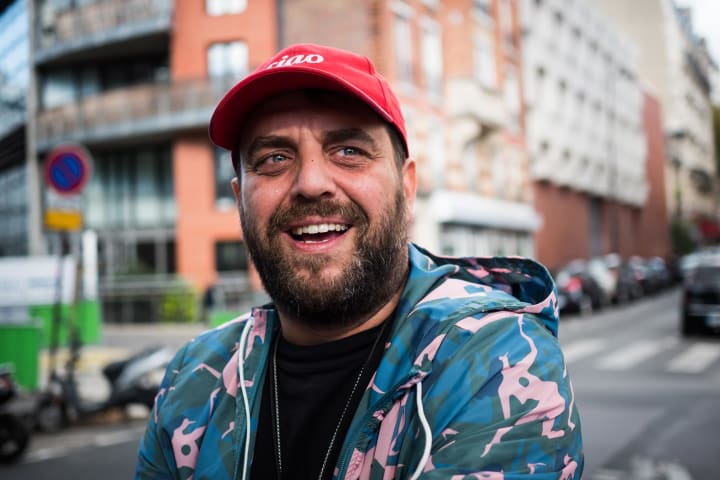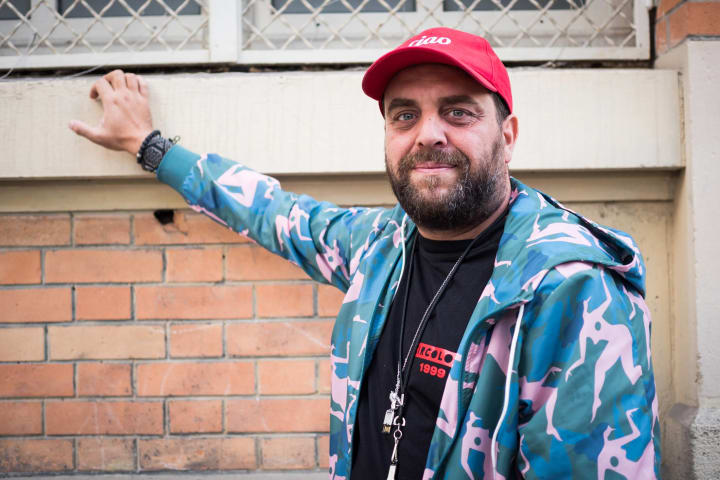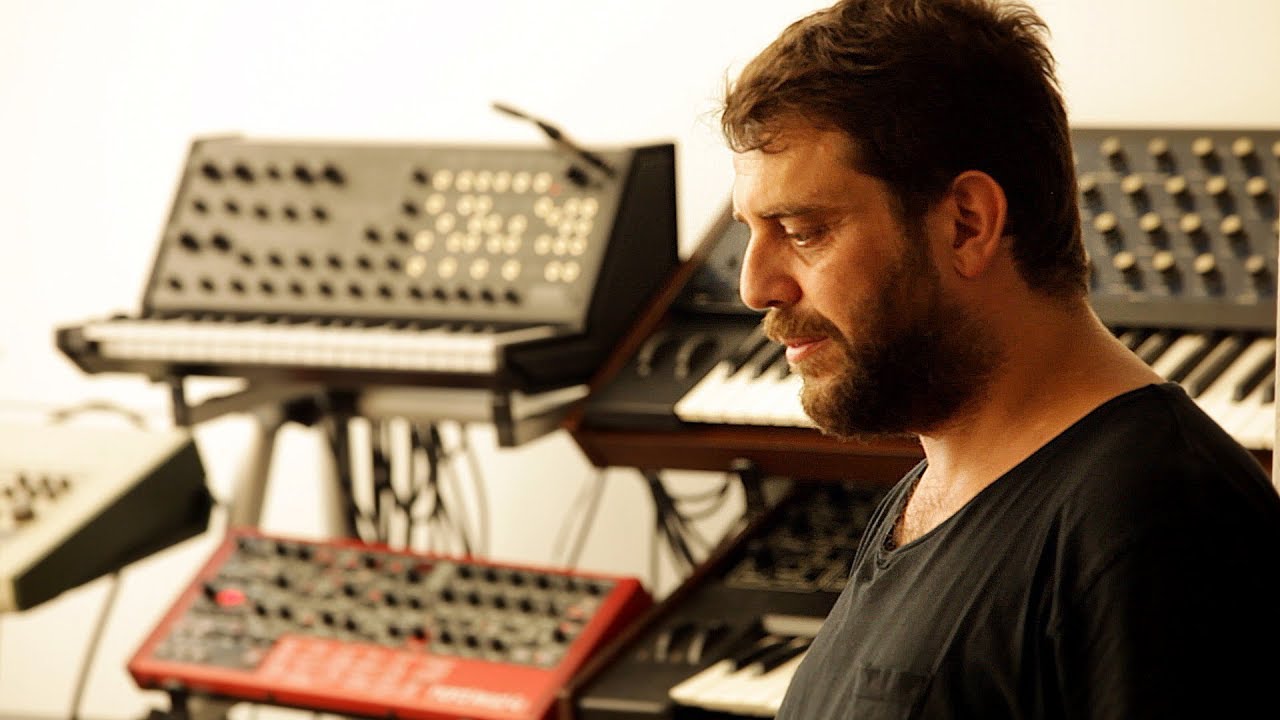
A Conversation With DJ Tennis About Life And Death, Burning Man And Social Media
Semi-professional tennis player, student of computer programming, punk rock band manager, chef—Manfredi Romano has worn many hats over the years. Since stepping out as DJ Tennis in 2010, the Italian has also seen electronic music trends come and go and watched fellow DJs rise and fall. Meanwhile, DJ Tennis has amassed a steady, sizable and devoted fanbase thanks to his colorful personality, willingness to embrace change and refusal to follow anything other than his own discerning instincts.
[See DJ Tennis at our festival in Warsaw. More info can be found here.]
Admired by his peers and fans as a brilliant, eclectic selector, the mainstay of one of the underground’s best loved labels, Life and Death, and a talented, emotive producer in his own right, DJ Tennis is in this game for the love of it and for the long haul. Ahead of his performance in Warsaw this weekend, Telekom Electronic Beats had a wide-ranging chat with DJ Tennis in Paris, touching on Burning Man posers and co-dependency syndrome.
https://soundcloud.com/timsweeney/djtennis2018
Where are you living right now?
My main base is Miami. I spend summer in Europe. My base for summer this year is Amsterdam; last year it was Barcelona. I like Amsterdam a lot better, actually. It’s small—700,000 people. It’s very well organized. It’s very easy and simple. It works very well.
What made you choose Miami as a base?
Five years ago, I chose Miami for love. Also, I was interested in going somewhere that was central for the US and South America. It’s important to me because they are big markets for me. I think the market there is bigger [than in Europe] for me. It’s growing a lot.
I saw you tweeted about playing an all-vinyl set in a dust storm.
That started as a joke, then it became a reality, then there were so many dust storms. What was a challenge became impossible. Literally, we tried, and in two seconds the vinyl was covered in dust and not playing anymore. We wanted to create a challenge with a lot of mistakes and crazy things, and we wanted it to be funny. We wanted to do it but not seriously. We wanted to create a sort of Boiler Room with all the models behind us but with some freaky things going on. It was supposed to be this semi-fictional thing, but it was impossible to create. Next year, we’re going to create this bubble that is protected from the dust and break the laws of isolation and create a satellite device and live stream it a bit [laughs].
Do you think Burning Man has changed a lot in the past eight years?
It’s changed in the sense that, of course, more people know about it because of social media. Social media created an interest among the people who wouldn’t usually go there. There are more posers and VIPs that want to go, but it’s still like 5% of the whole thing. 95% of Burning Man is still people who don’t give a fuck about posing and all that stuff. So you see all the posers on social media, and you think that’s it, but it’s not.
Life And Death seems to have gone through a few life cycles over the years.
Yeah, I had a few phases. The beginning of Life And Death was really hyped, then it became more normal and routine. Now we have new Life and Death artists. It’s actually fresh, and there is a new restart. It was called Life And Death because when it started it was bringing back sounds or trends that were really dead. At the time, there was a lot of minimal, just only percussive, not very interesting stuff, and we wanted to bring back melodies, indie, singing, and getting out from what was the comfort zone at that point.
And you’re running Life And Death by yourself now?
Yes, for the past two years I’ve been running it by myself. We had a kind of fracture between Life And Death and Tale of Us and Afterlife [Tale of Us were part of the Life and Death family before they started the Afterlife label]. It kind of went naturally that way. It hasn’t really been discussed. We had different opinions on musical evolution. I wanted to be evolving and changing all the time and staying more underground, and Tale of Us wanted to do their thing. Greg [Oreck, of Thugfucker, with whom DJ Tennis co-founded Life and Death] and I opted for different musical paths and the scission felt natural.
It feels like you are quite free at Life And Death and not so restricted by style or genre. Whereas with styles that are quite narrow, it feels like they’re eventually going to fall out of fashion.
The rule with Life And Death…it’s a dance label, so I cannot do an experimental jazz album. We need to stay a little bit in the dance environment, but in a way it’s completely open in regards to genre. In my experience, diversity and trying to evolve is just…I prefer it, just because it’s more challenging and more interesting to explore new things all the time. Afterlife has had huge success, but I’ve seen things through the years like Ed Banger and M-nus. You know, that at some point, they lost it. This is just my analysis of history. It’s not necessarily going to happen, but I grew up with so many genres. And I get super bored if I listen to too much of one thing. I can make a lot of money in a short time, and maybe I’d have made a lot more money if I stuck on a mono sound big room model. But what Life and Death was becoming…In a way, I’d prefer to keep generating. I’d like to do something that maybe disappoints someone but surprises someone else.
Tell me about your time tour-managing punk bands.
I started tour-managing…the word “manager,” I think, for punk rock music, is very weird, it works much better if you’re a celebrity. Then you need a manager. But tour managing—being someone that helps, like the fifth element of a four-piece band—you’re kind of seeing things from the outside. I don’t really consider that managing, but that’s what I was doing. I did it from 1992. I did different jobs after that. I organized events and tours. I had an agency called Daze in Italy from 1995 to 2010. Then I was collaborating with a record shop in Pisa. I was doing stuff in squats, like selling vinyl from the Washington [D.C]., New York, San Francisco post punk scene of the ‘90s— I’m talking about Dischord, Alternative Tentacles, SST, Touch and Go records in Chicago, all these worlds. That’s how I started working in music, really. I finished my studies in computer programming, but I never worked in it.

Would you say you’ve brought some of your punk background to Life And Death?
Punk, or whatever punk is, which is a very wide concept in a way…punk is an attitude. It’s more than a sound. You can find the punk attitude in the electronic world if you want to go to Warp Records, Schematic, Otto Von Schirach, Autechre, Black Dog, Suicide or Martin Rev. There are a lot of shades of this. Most punk was born as a reaction to the oversophisticated, overmarketed, overproduced, overexposed mainstream music scene. It’s the same in electronic music. You can do a record on your own, and you can achieve and reach a very wide crowd on a completely different level to raving or dancing without necessarily having big structures behind it.
A band is a lot of work. Writing and recording an album and making it sound proper is a lot of work. In the ‘90s, we maybe had a cheap keyboard and a drum machine, and you could create great records. And that’s pretty much it. That was quite punk. At some point in the ‘90s, electronic labels were the only independent ones. I don’t think I can say that Life And Death has a punk attitude because that would be a bit pretentious. But I certainly learned from punk. Life and Death didn’t start as a big promotion. It was pretty much completely homemade. We didn’t have a label manager. We didn’t have anyone. We were just a bunch of dudes making things on their own. The point is: Always trying to create something interesting, musically speaking, without committing to any standard, cliché or genre—I can’t say it’s punk, but in a way, it was a reaction to what electronic music was at the time.
I saw you play at Rituel Days in Paris last night. How will you play your set in Warsaw, alongside a different and quite eclectic set of artists?
For me it’s never…I never plan anything. I can play a very techno set. I can play a disco set. I can play an electro set. I play a mixture. Last night, it was really driving for the first hour, then I started going more eclectic. Consistency makes people dive into a state of mind, and then twisting their state of mind can be a refreshing thing. And I always think to bore the audience is a good thing, like playing with their emotions. It was consistent, and then it’s like a roller coaster. Once you get people to trust you and feel comfortable, then you can go everywhere, but first you have to gain their trust.
Do you get sick of people asking you about your name?
No, I like it. At the beginning, everyone was making fun of my name, but now there’s DJ Boring, DJ Sports, DJ Seinfeld. There’s a big list of weird names, and it kind of makes me feel like…I was one of the few that was doing the auto-ironic thing with the name, at the time, and now other people are doing it, which is ok [laughs]. It’s comforting. I named myself after the tennis club in Sicily where I used to play parties. The party was successful at the time. I had a collection of Italo disco. I liked Italo disco a lot. It was kind of born as a punk thing. It was literally Italians looking at Americans doing disco with orchestras, bass players, millions of microphones, crazy singers and Quincy Jones, but Italians just had drum machines and a keyboard. It was like, ‘Let’s do it with singing in very bad English, with a standard beat and cheesy melodies but a driving bassline.’ Italians tried to imitate Americans, but in a way, without knowing, they generated their own genre.
Do you find it hard to keep up with the DJ lifestyle?
I don’t party so much outside of playing. I definitely enjoy playing, and I definitely enjoy partying while I play, but, for example, I don’t drink anymore. And I needed to quit that just to keep up with the rhythm of this lifestyle, which is crazy. Looking at it from the outside, it looks crazy, and people say, ‘How do you do it?’ And I don’t know how I do it. I say if you enjoy what you do, if you know how to create a balance, if you learn how to sleep and not exaggerate with alcohol and put a limit on things and try to interact with your normal life…It’s important to not just live in a bubble. Interact with normal problems. Talk to people about normal things, and commit to your job, looking at it as a job. It’s actually a fun job. The real job is travelling, so you do it with pleasure. And you look forward to the next gig. At some point I’m going to get tired, but right now, absolutely not.
When you do get tired, do you think you’d like to do more producing, both for yourself and other people?
I’m learning. I saved some money and created a really good studio. It’s going to be finished soon in my house in Miami. I’m enjoying producing more and more. I was not really good at creating dance music. I was working in the studio more on commercials and soundtracks. I would say I got to learn and like a lot of things, and I learned to produce music better. But there’s never a limit to how much you can improve. And now I already started some production for other people, but I’m now ready to work more in the studio, to lower the number of dates I play live a little bit and just improve and get in the studio.

You say some interesting things on Twitter. I was intrigued by a recent tweet: “It feels so good to feel again.”
I feel like we’re just now seeing the long-term effects of DJing and DJ culture. I mean the psychological, not just physical effects, like getting detached from reality. All the people who follow the party scene, a lot of the millennials have developed this syndrome called co-dependency syndrome, where you see yourself only related to an environment and not as an individual. That’s what people don’t talk about so much. Nowadays, with social media, you have to stand for something. You create. You define yourself based on what you’re surrounded by. You get addicted to being social, but you’re not really being social. I don’t have this rage or this rush of trying to show something or achieve something to the people, and this can distract you from talking about deeper things.
This world is full of a lot of small talk, and a lot of people are afraid and don’t really take risks anymore, at least publically. So when you talk to someone, there is no conversation. You can’t go deeper. Nobody exposes their real struggles. And so when people acknowledge that and look into themselves and search and really express their feelings…It’s nice to feel in that way. That tweet referred to a personal thing that happened to me. I had a chance to have a confrontation and talk about feelings again, which sometimes feels lost. I also tweeted a quote from Charlie Chaplin. “People think too much and feel too little.” Most of the people nowadays base their own choices on expectations that other people have rather than spontaneously doing what they want to do. Not just in DJing, but in general, and that’s very much influenced by social media. I feel that if you use it the right way, it’s an interesting tool, and if you use it the wrong way, it’s just killing you.
Who or what are you excited about at the moment, musically speaking?
Right now I’m excited about Luke Jenner from The Rapture and his new project Meditation Tunnel. I taught him to use Ableton, literally, because he is a rock man. We’ve started another project together called Lucky Blue Eyes, which is a very dark indie project, but it’s interesting how songwriters deal with electronic music. This is what I am waiting for. Bring me more of this! I’m also excited about playing the Life And Death party at ADE and the after party with surprise special guests. We say, “Trust us, you’re going to buy your ticket blindfolded, but you’re going to be rewarded.” I’m also excited about playing at The Loft with Job Jobse. It’s such a special location. I wanted to be joined by Job because he’s one of the most refreshing and creative and free DJs that I know nowadays. You never know what to expect with him. That’s what I like. Job is surprising because he breaks with expectation in an incredible way.
How do you feel about the current state of electronic music?
You see all this talk about Konstantin and you have to ban him from ADE. There are way more important things than focusing on this one case. The women in this industry are a reflection of all industries, like sports, management and politics. We are changing, and we have to work not just in the DJ world but across everything to make these changes happen.
I think it’s too narrow to focus on him. I’m not defending Konstantin because I don’t know what really happened. It came from an interview. I know him. He’s a very sarcastic person, and it could have been taken out of context. But I think it’s not healthy to focus on one case. I’d rather talk all together about how to change these things in the right way. People have to make efforts instead of pointing fingers. They have to make efforts to find solutions.
I don’t participate in this social media slaughtering. I hate it, and sometimes I find it’s not a good learning process for the new generation. Everything’s becoming more conservative and closed. A lot of people stand for something—Israel, Palestine. Most of the people don’t even know the topic properly. Just because they feel they have to. This, like co-dependency syndrome, is a result of misuse of social media. It’s good to have situations like what happened with Konstantin to point at as an example, but you don’t have to only point at the example. Where are we going, on different levels and across different scenes? To find a solution we need to look at the bigger picture, I think.
To see more photos by Kimie Tanaka, visit her website.
Published September 27, 2018.

